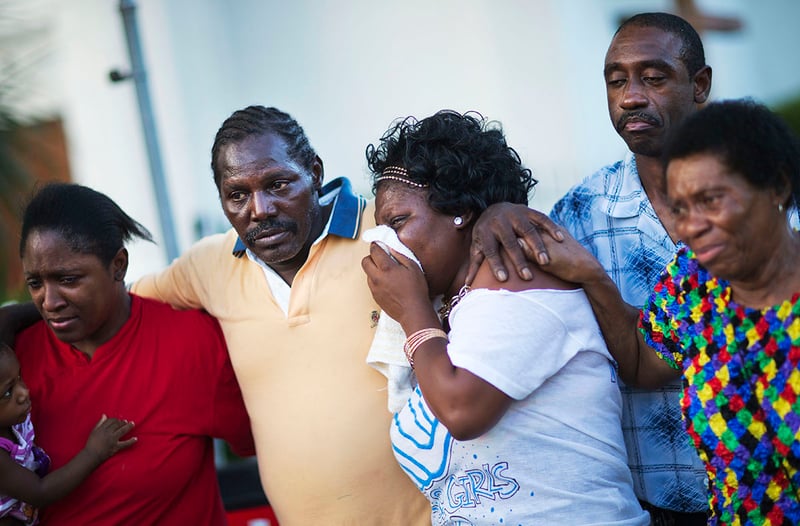The Charleston Tragedy: A Time to Sigh and Cry
On June 17 a deranged individual gunned down nine churchgoers in Charleston, South Carolina. As these violent tragedies increase, how should we respond?
Gary and Aurelia Washington, center left and right, the son and granddaughter of Ethel Lance who died in Wednesday's shooting, leave a sidewalk memorial in front of Emanuel AME Church comforted by fellow family members Thursday, June 18, 2015, in Charleston, South Carolina (AP)
The historic church is located in Charleston, South Carolina, the state where I was born, and I hurt from the heart for the victims and for the family of the shooter.
These horrific acts of violence are occurring more and more. Sadly, it is not outlandish to suspect that another random massacre will occur before 2015 ends. In the next few days, the media and politicians will weigh in, and discussion and debate will rage. But then this will fade to the background, and much of the news media will return to preoccupation with trivial news about entertainers until the next terrible act of senseless violence occurs.
And if we are not careful, you and I can become so desensitized to these acts of violence that the reality of nine people being gunned down basically goes in one ear and out the other.
Sighing and crying for this nation
Centuries ago, God inspired the prophet Ezekiel to write: “And the LORD said to him, ‘Go through the midst of the city, through the midst of Jerusalem, and put a mark on the foreheads of the men who sigh and cry over all the abominations that are done within it’” (Ezekiel 9:4, emphasis added throughout).
We’d much prefer to shout and cheer for our nation. Leaders from John Winthrop to Ronald Reagan have described America as “a shining city on a hill.”
But even to those who have admired America, the light of that “shining city” is fading in the winds of moral change that are sweeping the country. Instead of leading the world in freedom, morality, goodness, justice and safety, we are noted for violence, crime, moral decline and political and culture division.
Ezekiel’s words apply to this nation: “Make a chain, for the land is filled with crimes of blood, and the city is full of violence” (Ezekiel 7:23).
Indeed, we live in “perilous times” (see 2 Timothy 3:1-3).
All human beings are made in God’s image, and it should grieve us to see life senselessly snuffed out through acts of violence.
Warnings for today
Jesus Christ warned: “But as the days of Noah were, so also will the coming of the Son of Man be” (Matthew 24:37). In other words, the time preceding Christ’s second coming will be marked by similarities to the time of Noah.
What was the society of Noah’s time noted for? “The earth also was corrupt before God, and the earth was filled with violence” (Genesis 6:11).
Indeed, the Charleston massacre reinforces the fact that our world is increasingly filled with violence—just like the world of Noah. This trend will only continue and worsen, leading up to the end-time events that will culminate in mankind nearly destroying itself (Matthew 24:22).
What should we do?
So, how should we respond to these tragedies?
1. “Sigh and cry” (Ezekiel 9:4).
We must ache for all concerned, not just those who lost their lives. Sensitivity to the suffering of others is an important trait for Christians to have (Romans 12:15; Colossians 3:12; 1 Peter 5:9). All human beings are made in God’s image, and it should grieve us to see life senselessly snuffed out through acts of violence.
2. “Seek first the kingdom of God” (Matthew 6:33).
The Bible shows that the rule of the Kingdom of God on earth is the only hope mankind has for a peaceful world. The Kingdom of God is the only solution to violent massacres like we recently witnessed in Charleston. Tragedies should intensify our focus on the return of Jesus Christ and the establishment of His Kingdom on earth.
Read “World Peace: How It Will Come” to learn more about the real solution to evil and violence.
3. “Repent” (Mark 1:15).
Witnessing sin and suffering in the world around us should motivate us to personally repent. This was the lesson Jesus Christ homed in on when tragedies occurred nearly 2,000 years ago. He said that those who died in tragedies weren’t specifically being punished because they were more evil than anyone else. The lesson He emphasized was: “Unless you repent, you will all likewise perish” (Luke 13:5).
As the news continues to demonstrate, we live in dangerous times. Suffering abounds throughout the world. In areas like the Middle East and Africa, violence kills multiple people every day.
Are we sighing and crying?
For further insight into the cause of human suffering, download our free booklet Why Does God Allow Evil and Suffering?
Also, read our blog posts covering past tragedies:
- Sandy Hook: Making Sense of a Senseless Tragedy
- A Week of Mass Murder: Why So Much Violence in America?
- A Message of Hope After a Week of Violence
- The Value of Life: Reflecting on the Aurora Movie Massacre
Date Posted: June 19, 2015

